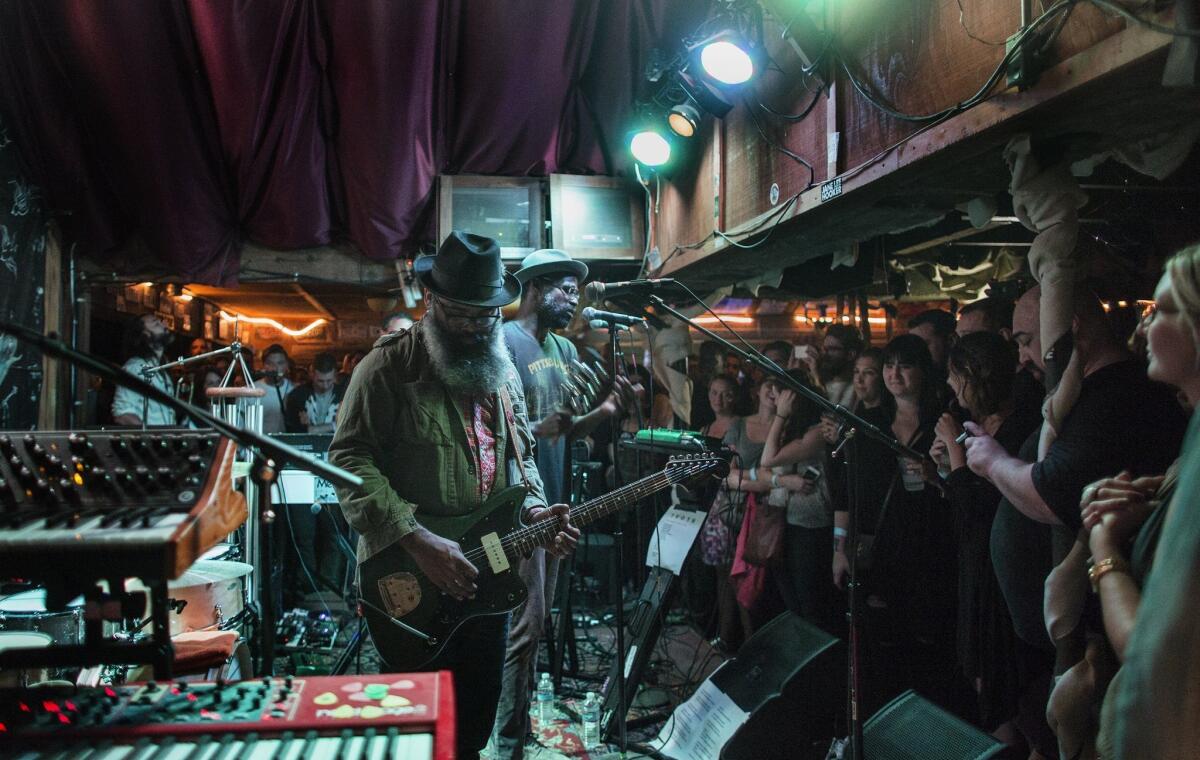Regrouped TV on the Radio hits road, plants new ‘Seeds’

The main attraction at a sold-out gig, TV on the Radio wasn’t scheduled to perform until after 10 p.m.
But at Pappy & Harriet’s, the dusty little roadhouse off Route 62 near Joshua Tree, sound check is far from a private affair. So on a recent Friday afternoon, Tunde Adebimpe and Jaleel Bunton found themselves with an audience of grizzled bikers and late-lunching tourists as they tested their gear hours before showtime.
“What should we play?” asked Adebimpe, the taller of the band’s two bespectacled lead singers. Twisting dials behind a mixing board, the sound guy suggested a song from TV on the Radio’s new album, “Seeds,” due Nov. 18 from Harvest Records. Bunton, on bass, had a different impulse, and soon enough the room was jamming to a breezy rendition of the theme from “Ghostbusters.”
A surprising bit of repertoire for these brainy critical darlings? Maybe. Really, though, TV on the Radio has been in the business of upending expectations since it emerged from the same early-2000s scene that produced the Strokes and the Yeah Yeah Yeahs. Back then, this racially diverse, stylistically adventurous outfit was challenging ideas about what a New York rock band should look and sound like.
Now, three years after the death of bassist Gerard Smith led to a hiatus nobody was certain would end, TV on the Radio has returned with a bold record that shakes up the band’s approach even as it emphasizes the group’s staying power.
“When I think of TV on the Radio, I think of a band that’s part of a lineage that includes my favorite art-rock pioneers: Brian Eno, David Byrne, David Bowie,” said Chris Douridas, a DJ at Santa Monica’s taste-making KCRW-FM (89.9), which will air a live performance by the group on Nov. 20. “They’re the heir apparent to that mantle.”
And yet Adebimpe and his mates weren’t sure whether they wanted that role after they finished touring behind their 2011 album, “Nine Types of Light.” The band’s slowest, most contemplative effort — and the first made in Los Angeles after guitarist-producer Dave Sitek’s move here in 2009 — “Nine Types of Light” came out mere days before Smith died of lung cancer, a tragedy the music seems almost to presage with gloomy (if beautiful) tones and words about fading away into the night.
Today the musicians decline to talk in detail about Smith’s death. But it’s clear they’re grappling with the loss: At Pappy & Harriet’s, they played songs from each of their five records except “Nine Types of Light.”
“We just needed to take a break,” Adebimpe said of the tumultuous period that followed that album. Sipping a cup of tea, the singer was gathered with Sitek and TV on the Radio’s other singer, Kyp Malone, at a picnic table behind the venue; they’d booked the date in Pioneertown between bigger concerts in L.A. and Las Vegas. “After a while, no one had said, ‘It’s time to make another record.’” As a result, the members spent much of 2012 concentrating on other projects. Adebimpe formed the Higgins Waterproof Black Magic Band, while Sitek started a label, Federal Prism, and produced records by the Yeah Yeah Yeahs and Beady Eye.
Eventually, they agreed to assemble at the guitarist’s home studio to “try to make one or two songs and see how that goes,” recalled Adebimpe, who like Sitek now lives in L.A. “And it went really well.” Last year the band released a pair of singles — “Mercy” and “Million Miles” — then kept working. “At some point we had enough demos that it became pretty obvious we could make an album,” Adebimpe said.
In his parched smoker’s rasp, Sitek said the time away refreshed his enthusiasm for TV on the Radio. “Whatever it is you do, it’s easier to see the special things about it when you’re not in the middle of it,” he explained.
For him, though, those special things had changed: No longer was he as interested in the densely layered guitars and keyboards that defined the band’s early work, particularly its 2006 breakthrough, “Return to Cookie Mountain” (which featured a cameo from Bowie, an avowed fan). Instead, Sitek was determined to construct the music around Malone’s and Adebimpe’s singing — to “get back to the storytelling aspect of songs,” as he put it.
Vocals definitely take a more prominent position on “Seeds,” be it Adebimpe’s yearning falsetto in “Test Pilot” or Malone’s breathy whisper in “Love Stained.” And though the songs are still streaked with trippy textures, they’re far less shrouded in mystery. They’re describing universal experiences (desire, fear, regret) in language unabashed about touching those primary themes.
Asked if that shift represents a counterintuitive risk for a band with an established sonic identity, the three laughed.
“It means we’re bad businessmen,” Sitek said. “We made New Coke and Crystal Pepsi all in one record.”
That may be the case: As the guitarist jokingly pointed out, none of TV on the Radio’s albums has gone “aluminum,” let alone gold or platinum. (“Return to Cookie Mountain,” the band’s most commercially successful release, has sold 242,000 copies, according to Nielsen SoundScan.)
Yet the band’s dogged pursuit of its vision — especially in the wake of an event as destabilizing as Smith’s death — also signals that it’s thinking long-term, building an audience that trusts the group to evolve.
Harvest’s general manager, Piero Giramonti, said he signed TV on the Radio to be a “cornerstone artist” at the newly launched company with major-label ties, something like Sonic Youth was on Geffen Records in the early ‘90s. “In an era of disposable bands who have some hits and then disappear, this is a band that will have a lasting legacy,” Giramonti said. And that credibility, he added, attracts other talent.
Having lived through the transition from CDs (which people paid for) to digital music (which people can stream for free), the members of TV on the Radio are skeptical about what a label can do for them in 2014, even with an album as relatively accessible as “Seeds.”
“I feel like anyone who’s committing their lives to selling records right now believes in magic,” Malone said with a chuckle.
“‘What we’re gonna do is take this car and crash it into that wall,’” Adebimpe joined in, impersonating a hopeful executive. “‘Unless we go through the wall.’”
Still, Sitek reasoned that although the musician’s life has become “a grind” — not least “when you’re in your 40s and people are getting married and having kids and you’re still committed to this thing” — the dismantling of the record industry has made it easier to focus on art, since there’s little assurance of financial reward.
“How is this a thing we still get to do?” he said, gesturing toward the tiny stage where he’d soon entertain the 4 p.m. crowd. “When I look at all the people I know who’ve been in phenomenal bands that couldn’t make it past four years for whatever reason, and we’re still here?”
“It’s like the ground floor,” said Adebimpe, “is possibility.”
Twitter: @mikaelwood
More to Read
The biggest entertainment stories
Get our big stories about Hollywood, film, television, music, arts, culture and more right in your inbox as soon as they publish.
You may occasionally receive promotional content from the Los Angeles Times.











